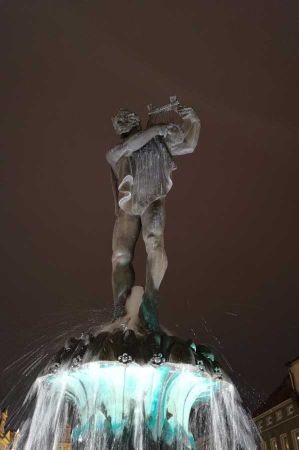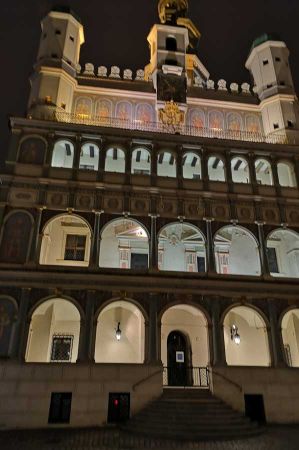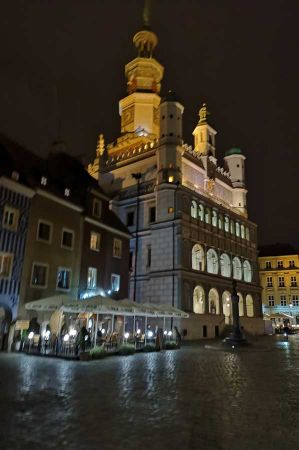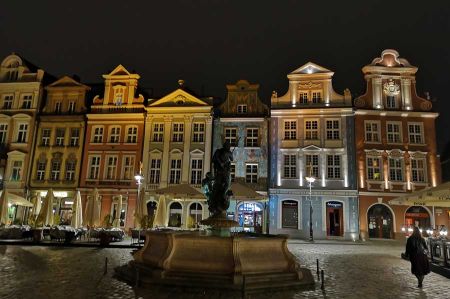Poznań - After building our exhibition booth to Old Market
- Written by Portal Editor
Poznań - After a successful hygiene concept with regard to the corona pandemic by the trade fair management of the Caravan Salon Düsseldorf, the next stop this year for reduced trade fair participation was the Caravan trade fair in Poznan as an exhibition location.
With the understandable scepticism in mind as to whether and to what extent participation in trade fairs makes sense, it is always about economic effects and prospects. So the journey went without any problems, the exhibition grounds were well prepared (the body temperature was measured at the entrance) and the hygiene concept was prepared in a similar way to Düsseldorf, so that the construction of the exhibition stand was possible almost according to plan, but more on that later. The construction was done, and the auspicious old town of Poznan attracted with its historic market square and countless restaurants, especially since we were physically exhausted and more than hungry.
Poznan Old Market - a tourist highlight in Poznań
 Today the Old Market in Poznań, known in Polish as Stary Rynek, is the square in Poznan that was created as a marketplace for the buying and selling of goods when the city was founded in 1253. With an area of around two hectares, the Old Market is the third largest market square in Poland (following the ones of Kraków and Wrocław marketplaces) and one of the largest in Europe. Until the Second World War, it was the centre of the city's economic and political life. As a result of the war, it was almost destroyed. After the reconstruction, thanks to the excellent restoration it is one of the most visited tourist attractions in the city. The market square has a square floor plan with a side length of about 141 m and surrounds, typical of the Polish Rynek, a group of public buildings and shops.
Today the Old Market in Poznań, known in Polish as Stary Rynek, is the square in Poznan that was created as a marketplace for the buying and selling of goods when the city was founded in 1253. With an area of around two hectares, the Old Market is the third largest market square in Poland (following the ones of Kraków and Wrocław marketplaces) and one of the largest in Europe. Until the Second World War, it was the centre of the city's economic and political life. As a result of the war, it was almost destroyed. After the reconstruction, thanks to the excellent restoration it is one of the most visited tourist attractions in the city. The market square has a square floor plan with a side length of about 141 m and surrounds, typical of the Polish Rynek, a group of public buildings and shops.
When the city was founded in 1253, the locator Poznań, Thomas from Guben, made a tenth of the 20 hectares available for the city available for the city's market square. On each side (about 140 m in length) 16 pieces of land were identified, which the locator and the first members of the patriciate had available when the city was founded. The first houses in the city were built on top of this using a closed construction method. A total of twelve streets lead to the square.
The building ensemble on the Old Market
 At the end of the Second World War, the old town of Poznan was badly damaged. The patrician houses around the square, mostly from the Baroque era, were also destroyed and were rebuilt in their historical form after 1945, or at least their facades.
At the end of the Second World War, the old town of Poznan was badly damaged. The patrician houses around the square, mostly from the Baroque era, were also destroyed and were rebuilt in their historical form after 1945, or at least their facades.
The building group in the middle of the square includes:
Old Town Hall - built in the 1550s, the most important architectural monument in the city and one of the most important Renaissance town halls in Europe. Today the Museum of the City of Poznań.
Row of buildings of the three-storey shopkeepers built from 1535 with their characteristic arcade, originally shops and apartments of small traders.
behind it two elongated, modern functional buildings for the military museum and the city gallery "Arsenal" for modern art
behind the town hall the city scales, a reconstruction based on the state of the 16th century
on the west side the classicist Hauptwache - a facility rebuilt in 1787 by Johann Christian Kamsetzer, in it today the Museum of the Poznań Uprising of 1918/19
East Side:
 Stary Rynek 42–45: The three town houses from the 16th to 19th centuries house the musical instrument museum
Stary Rynek 42–45: The three town houses from the 16th to 19th centuries house the musical instrument museum
No. 50, 51: The only two houses from the late Middle Ages
Wodna No. 27: The Renaissance palace of the Górka family from 1549 forms the south-east corner of the square. Today it houses the Archaeological Museum, which focuses on the archaeology of Poland from the Stone Age to the Middle Ages and excavations in Athribis, Lower Egypt.
West side:
No. 75: The Golden Lion Pharmacy from the early 19th century was only slightly damaged in the Second World War
No. 78: Dzialynski Palace (Pał ac Działyńskich) - early classical building from the 18th century
No. 84: House of the town hall builder Giovanni Battista di Quadro, today a literary museum dedicated to Henryk Sienkiewicz, author of the famous historical novel Quo Vadis
North side:
the neoclassical Mielzynski Palace (Pałac Mielżyńskich) - (1795–1798)
The Hotel Rzymski Poznań is not far from the Old Market.
Please read as well:
Returning of starlings at Lake Federsee near Bad Buchau
Gdansk - recreational nature reserves line the bike path
-
 Poznań Old Market Square at Night
Poznań Old Market Square at Night
Poznań Old Market Square at Night
Poznań Old Market Square at Night
-
 Poznań Old Market Square at Night
Poznań Old Market Square at Night
Poznań Old Market Square at Night
Poznań Old Market Square at Night
-
 Poznań Old Market Square at Night
Poznań Old Market Square at Night
Poznań Old Market Square at Night
Poznań Old Market Square at Night
-
 Poznań Old Market Square at Night
Poznań Old Market Square at Night
Poznań Old Market Square at Night
Poznań Old Market Square at Night
-
 Poznań Old Market Square at Night
Poznań Old Market Square at Night
Poznań Old Market Square at Night
Poznań Old Market Square at Night
-
 Poznań Old Market Square at Night
Poznań Old Market Square at Night
Poznań Old Market Square at Night
Poznań Old Market Square at Night
-
 Poznań Old Market Square at Night
Poznań Old Market Square at Night
Poznań Old Market Square at Night
Poznań Old Market Square at Night
-
 Poznań Old Market Square at Night
Poznań Old Market Square at Night
Poznań Old Market Square at Night
Poznań Old Market Square at Night
-
 Poznań Old Market Square at Night
Poznań Old Market Square at Night
Poznań Old Market Square at Night
Poznań Old Market Square at Night
https://www.alaturka.info/en/poland/warsaw-warszawa/5174-after-building-our-exhibition-booth-to-old-market-in-poznan#sigProId27a64f2b77

